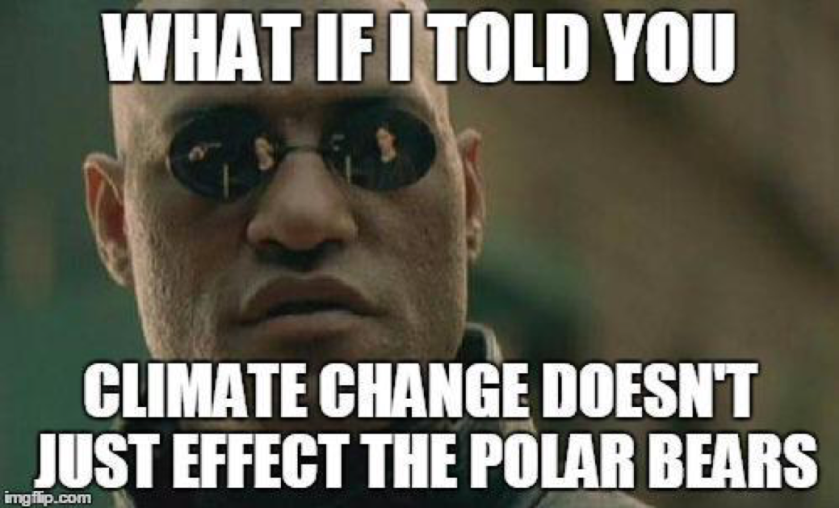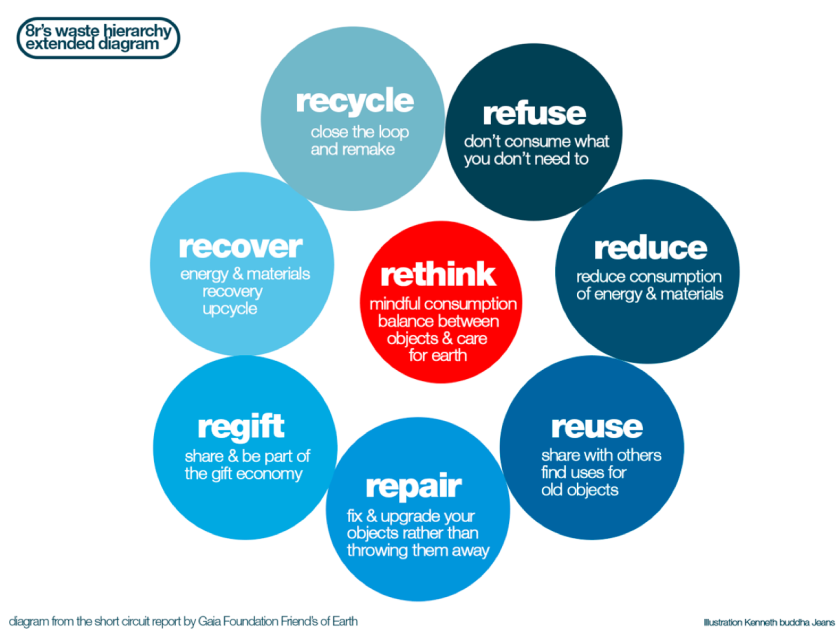In 1992 at The United Nations Conference on Environment and Development (UNCED) in Rio de Janeiro, also known as The Earth Summit, world nations agreed to create the very first international treaty against climate change – The United Nations Framework Convention on Climate Change (UNFCCC) which in turn led to the Kyoto Protocol and the recent Paris Agreement. The UNFCCC objective is to “stabilize greenhouse gas concentrations in the atmosphere at a level that would prevent dangerous anthropogenic interference with the climate system”.[1] Since then there have been held multiple conferences and meetings regarding climate action, however none of them led to drastic changes to prevent climate change from happening.
During this period, we have released into the atmosphere almost as much carbon as in the whole of the previous century. The record high heat waves and other extreme weather events are now occurring more and more often than in the past.[2] A large part of the West Antarctic ice sheet, as reported by scientists, is destined for destruction, which means that sea levels will rise by at least 1.2 meters in the coming centuries and possibly much more.[3] Air pollution, water-related diseases and shortage, hunger and malnutrition will only increase. We are already changing the map of the planet, especially in areas where animals, plants and people can live.

In the last half century, we have created a world where people cross the ocean within a day, use single-use plastics even not paying attention to it and use a personal car to commute daily. Fossil fuel has contributed to this – but if we want to prevent a climate disaster, we must go ahead without it by the second half of the 21st century.
Zero Waste is a recent movement. It aims not only to restrict consumption of goods, recycle or repair things, but also to avoid other polluting practices less related to waste – such as refusing excess energy consumption, buying eco certified goods or not purchasing products containing palm oil. Personal consumption does matter.

One of the important but less discussed principles of Zero Waste movement is to reduce energy consumption. Swiss scientists say humanity could limit its environmental impact if only 2 kilowatts of energy were consumed each year per person.[4] On average, the US population consumes almost 13 kilowatts per capita. In Bangladesh, this figure is 0,31. [5] This implies that the main challenge is to reduce consumption in the Global North. Changes in lifestyle, such as the abandonment of exclusive housing or switching to green solutions, would help to reduce these figures. Energy choices now and in the nearest future will have a major impact not just on the global climate, but also on water supplies and the resilience of energy systems that currently depend heavily on them.
Due to climate change, we will experience greater drought, more rain in the off-season, and less snow in mountain areas. The problem is that we “eat” more water than we drink. It is estimated that the average American uses about 7570 liters of freshwater per day. However, only five percent of this water (about 380 liters) runs through the taps and toilets. The rest of it is “hidden” in the food we eat and the products we buy.[6] It takes 1670 liters of water to produce 0.45 kilos of beef. And the demand for meat is on the rise. More important than water consumption of the animal farming is its carbon and methane footprint. The livestock sector is estimated to account for 15% of global greenhouse gas (GHG) emissions.[7]
Zero Waste movement can also reduce the meat and dairy consumption. The supporters of zero waste are usually more aware of meat or dairy alternatives as they have better knowledge and cooking skills, acquired by the practice of avoiding ready-made meals.
The way we produce, transport, consume and dispose of all our stuff accounts for huge percentage of total greenhouse (GHG) emissions. Consumers are responsible for more than 60 percent of the globe’s greenhouse gas emissions.[8] If we would consume less, our carbon footprint would also decrease. Minimizing excess consumption provides both psychological and financial benefits. Getting rid of unnecessary items might result in smaller bills, cleaner rooms, having more time spent outdoors or having a good time with family.
Recycling is one of the easiest ways to reduce your carbon footprint. It uses less energy and produces less pollution than making things from raw materials. For example, for glass bottles, 315kg of CO2 is saved per tonne of recycled glass even after taking into account the transportation and processing.[9] Reducing food waste and composting also helps a lot. If not composted, the waste has to be transported and it also produces methane as it decomposes in landfills. Methane is more efficient at trapping radiation – it contributes 25 times more to global warming than carbon dioxide per kilogram.[10]
The choices we make about our consumption has a larger impact than driving a car or heating our homes. However, in addition to your everyday zero waste efforts, to ensure the future of mankind, we need a global move towards a circular and sharing economy. We need long-lasting goods, while looking beyond business-as-usual model and discarding planned obsolescence. By switching to circular economy, we could reduce the demand for energy, raw materials and fossil fuels, and, consequently, the volume of greenhouse gases being released into the atmosphere would be significantly reduced.
1.U. N. (1999, April 23). United Nations Framework Convention On Climate Change. Retrieved June 21, 2018, from http://unfccc.int/files/essential_background/background_publications_htmlpdf/application/pdf/conveng.pdf
2.Mora, C., Dousset, B., & Caldwell, I. R. et. al. (2017, June 19). Global Risk of Deadly Heat. Retrieved June 21, 2018, from https://www.nature.com/articles/nclimate3322.epdf?referrer_access_token=g_uVry3TdI-vDGR1xw8ERtRgN0jAjWel9jnR3ZoTv0Nlcpopxh1V5GdQz8yAIWjClhZpJZ3HomV0Tkd0DRw8Cj2FQlWgefEGoctB6FYqCzxr7OgIBPKFQOsopiaLsqCkbTaLCt3g8whoBEjAk0uLOmn1wzsjR226DYcPohEchHFjbO2RT4maHEacsnDT5eOVS4RWes3JvpLpBxFyf1bDeFgUorRjNvGJbw7txwHXQvj3oGpAkhIEL9UF-uYCQwvx&tracking_referrer=edition.cnn.com. doi:10.1038/NCLIMATE3322
3.Gobbatiss, J. (2018, February 20). Global sea level to rise by up to 1.2 metres despite Paris agreement, say scientists. Retrieved June 21, 2018, from https://www.independent.co.uk/environment/sea-level-rise-climate-change-paris-agreement-global-warming-greenhouse-gas-a8219681.html
4. Morrow, K. J., Jr., & Morrow, J. A. (2008). Switzerland and the 2,000-Watt Society. Sustainability, 1(1), 32-33. doi:10.1089/SUS.2008.9992
5.Trading Economics (2014). United States – Electric power consumption (kWh per capita). Retrieved June 21, 2018, from https://tradingeconomics.com/united-states/electric-power-consumption-kwh-per-capita-wb-data.html
6.Modern Agriculture. (2015, January 25). Climate Change and Your Hidden Water Footprint. Retrieved June 21, 2018, from https://modernag.org/water-conservation/climate-change-and-your-hidden-water-footprint/
7.Norwegian University of Science and Technology. (2016, February 24). Consumers have huge environmental impact. Retrieved June 21, 2018, from https://www.eurekalert.org/pub_releases/2016-02/nuos-chh022416.php
8.Norwegian University of Science and Technology. (2016, February 24). Consumers have huge environmental impact. Retrieved June 21, 2018, from https://www.eurekalert.org/pub_releases/2016-02/nuos-chh022416.php
9.Carbon Footprint. (n.d.). Recycling. Retrieved June 21, 2018, from https://www.carbonfootprint.com/recycling.html
10.Climate Change Connection. (2007). CO2 equivalents. Retrieved June 21, 2018, from https://climatechangeconnection.org/emissions/co2-equivalents/


